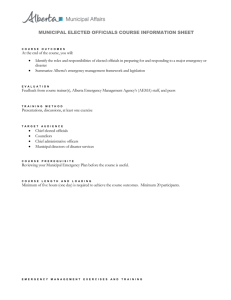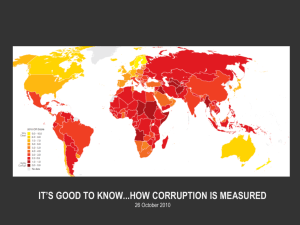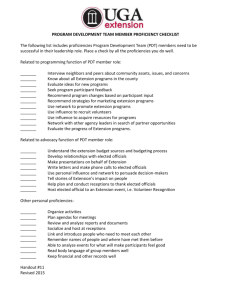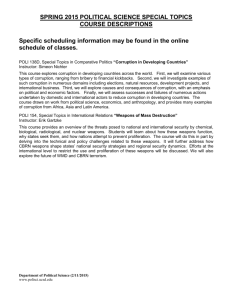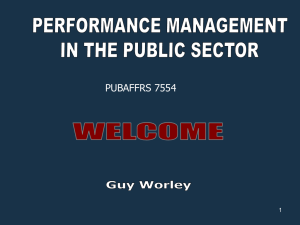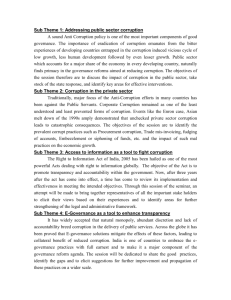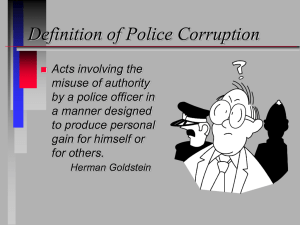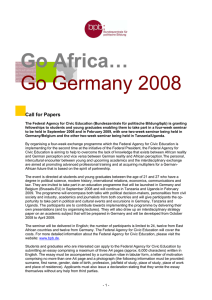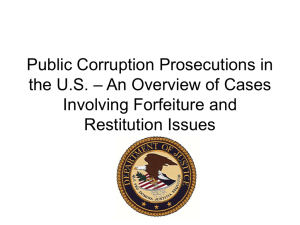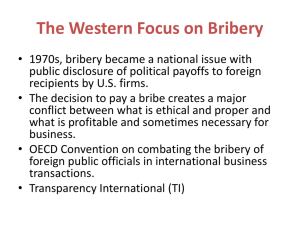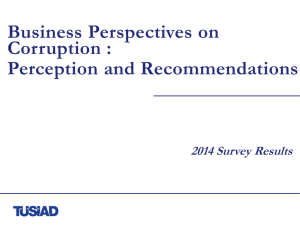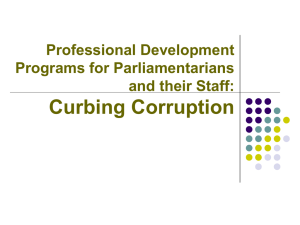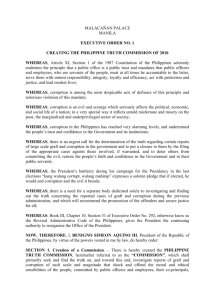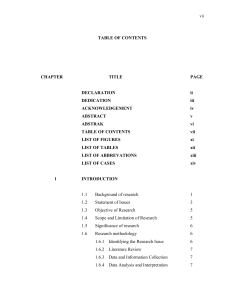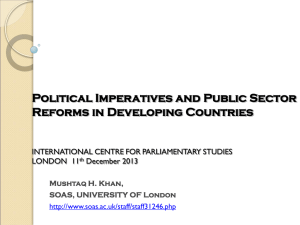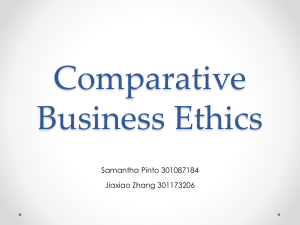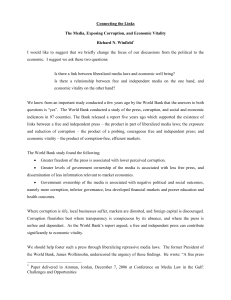The famous quip of Lord Acton, that “power corrupts and absolute
advertisement
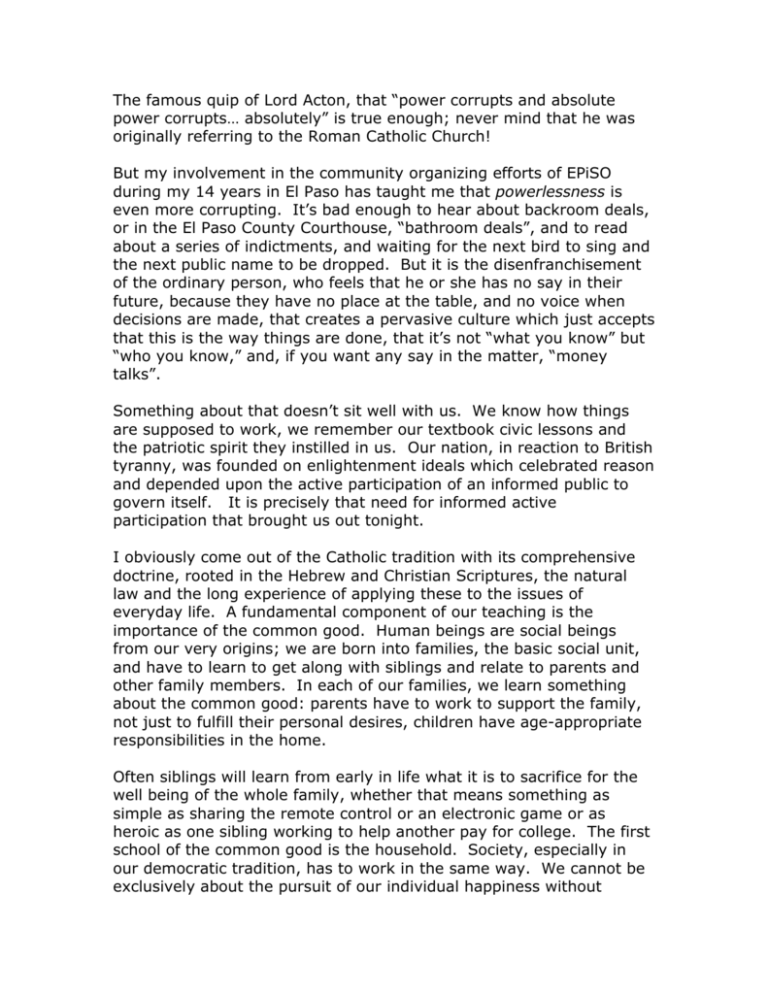
The famous quip of Lord Acton, that “power corrupts and absolute power corrupts… absolutely” is true enough; never mind that he was originally referring to the Roman Catholic Church! But my involvement in the community organizing efforts of EPiSO during my 14 years in El Paso has taught me that powerlessness is even more corrupting. It’s bad enough to hear about backroom deals, or in the El Paso County Courthouse, “bathroom deals”, and to read about a series of indictments, and waiting for the next bird to sing and the next public name to be dropped. But it is the disenfranchisement of the ordinary person, who feels that he or she has no say in their future, because they have no place at the table, and no voice when decisions are made, that creates a pervasive culture which just accepts that this is the way things are done, that it’s not “what you know” but “who you know,” and, if you want any say in the matter, “money talks”. Something about that doesn’t sit well with us. We know how things are supposed to work, we remember our textbook civic lessons and the patriotic spirit they instilled in us. Our nation, in reaction to British tyranny, was founded on enlightenment ideals which celebrated reason and depended upon the active participation of an informed public to govern itself. It is precisely that need for informed active participation that brought us out tonight. I obviously come out of the Catholic tradition with its comprehensive doctrine, rooted in the Hebrew and Christian Scriptures, the natural law and the long experience of applying these to the issues of everyday life. A fundamental component of our teaching is the importance of the common good. Human beings are social beings from our very origins; we are born into families, the basic social unit, and have to learn to get along with siblings and relate to parents and other family members. In each of our families, we learn something about the common good: parents have to work to support the family, not just to fulfill their personal desires, children have age-appropriate responsibilities in the home. Often siblings will learn from early in life what it is to sacrifice for the well being of the whole family, whether that means something as simple as sharing the remote control or an electronic game or as heroic as one sibling working to help another pay for college. The first school of the common good is the household. Society, especially in our democratic tradition, has to work in the same way. We cannot be exclusively about the pursuit of our individual happiness without regard for our neighbor’s well-being, because ultimately human progress and development is interdependent. In the most recent application of Catholic Social Teaching, Pope Benedict XVI issued an encyclical called “Charity in Truth” which addresses the present economic crisis. He states rather bluntly that the cause of our current economic crisis is that the financial market, with its goal of exponential gains, is seen as an end in itself, rather than a means to the common good. Personal greed, rather than improving the lot of the majority, was the driving force. The Pope argues that without some universal agreement on the importance of the common good and our fundamental interdependence, tinkering with the economy is not going to make much of a difference in the long run. According to Abraham Lincoln, a model of political integrity, government is meant to be “of the people, by the people and for the people.” That sounds like “the common good” to me. But if government is seen as a necessary evil, something that the Grover Norquists of the world wish to drown in a bathtub; if government is seen as an obstacle to real progress or better yet, to real profit, then the culture of corruption will predominate. If I get what I need to amass my fortune by contributing to the right campaigns and influencing the legislation that allows my special interests to dominate over the common good – and when that isn’t good enough, work a secret deal so that I can profit from the next project – as long as I am making a profit and can afford to do business that way, the system works for me. But if I am on the outside, if I can’t afford to compete with the big guys or can’t ante up for the next round, I am forced to do what I can to get along and cut the deals that I can make to provide for me, my family and my business. What has happened to the common good? This evening’s event is designed to help us all feel connected to the problem of corruption and to be part of its solution. Corruption is more than just a series of individual acts by certain public figures who might be tried and prosecuted. It is the hijacking of the common good by private interests, with the complicity of the majority who do not challenge this breakdown of the common good. It is time to re-learn our civics lessons, to hold our public officials accountable by paying more attention to what they do than to what they say. We need to demand greater transparency in government budgets, contracts and bidding processes. We need to constantly inform ourselves, which is a 2 greater and greater challenge when much of the news media has dedicated itself to entertainment and sensationalism rather than the pursuit of truth. Above all, we have to communicate to all those in public office that we are watching! Community organizing provides the best way I know to emphasize the common good and to promote civic engagement. It begins with people getting to know each other and sharing their stories and struggles, discovering common ground and the need to work together to improve their lives. They interact with neighbors, or parents from their children’s school or faith community and discover that they are not alone in their hopes and desires. They clarify and prioritize what it is they are working for and include more and more people with the same interests, bringing those issues before the officials who were elected to serve the community. They discover the power of collective voices for the common good. I have been very inspired by EPiSO’s Civic Academies on immigration, on the community colleges, on taxation, and on the children’s hospital, because I have seen ordinary people with no particular policy expertise, get together and study an issue and teach it to their friends and neighbors in a complete but easily comprehensible way. I have seen how people are empowered when they know they understand an issue and can contribute to its resolution. If immigration policy, taxation and other complex issues are seen as beyond the grasp of the ordinary person, there is no way that participatory democracy can work, nor for the common good to be served. Leaving it to the experts, or to the elected officials, and not staying informed contributes both to the corruption of the powerful and the corruption of the powerless. Opportunities like this to get together and share concerns and bonding with others to find common ground, then letting elected officials know that they are being observed and have to be accountable, is the way forward and out of the present mess. An informed and active public is the answer. 3
